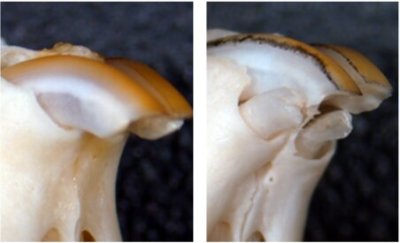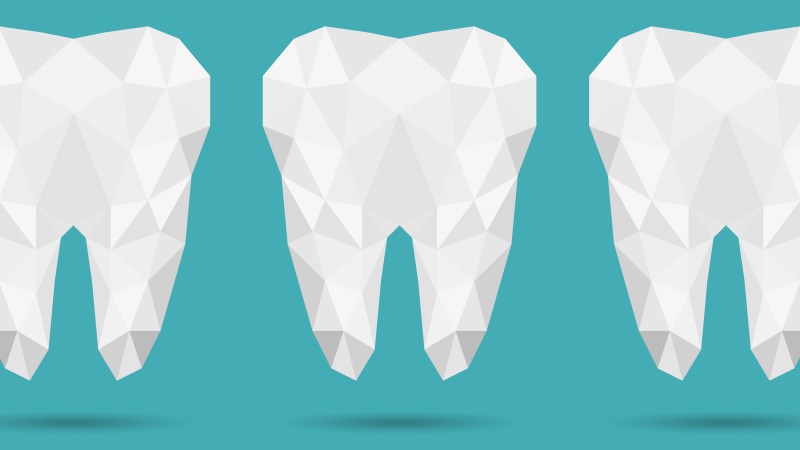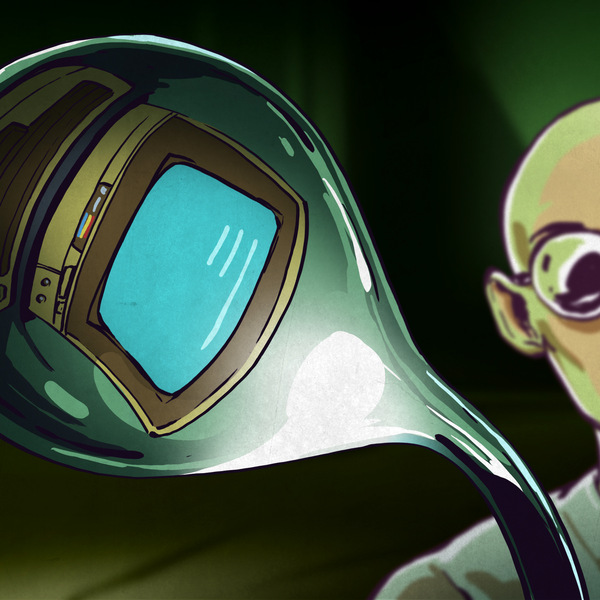We humans like to think we’re pretty advanced, but we can’t regrow missing teeth in adulthood like sharks, alligators, and crocodiles. Once those pearly whites are gone, they’re gone for good, and we don’t even have a way to regenerate the protective enamel. However, this may not always be the case, because scientists at Kyoto University and University of Fukui in Japan have discovered a monoclonal antibody treatment that triggers tooth regeneration in laboratory mice.

Monoclonal antibodies are lab-fabbed molecules that act as substitute antibodies to enhance the body’s natural defenses against diseases like cancer and arthritis. These antibodies are also used to develop vaccines and treat COVID-19. In the case of cancer, monoclonal antibodies bind to antigens on cancer cells, effectively flagging them for removal, but they also do much more, such as deliver chemo and radioimmunotherapies.
By blocking the gene USAG-1, the scientists saw an increase in Bone Morphogenic Protein (BMP), which is a molecule that dictates the number of teeth a given creature will have in the first place. Because of this increase in BMP, the mice were able to regrow teeth. This proposition was a challenging one — BMP affects other aspects of development, and the early attempts did more harm than good by causing birth defects. The good news is that the treatment also worked in ferrets, whose teeth are much closer to human dentition than mice. Before moving on to human trials, the scientists will test it out on pigs and dogs. If you were given a second shot at a set of teeth, would you treat them better than the first, or even worse because you can just grow new ones again?
Speaking of pigs, it seems that pig-to-human organ transplants are on track for 2021.
















Cool, I can grow a new set of wire strippers.
Been there, done that! 😬
Hmm, it seems that you are actually me… or am I you? My teeth are a bit out of sorts, but I’ll still strip wire this way if a proper tool isn’t immediately available.
Lego separating machines.
nail clippers
My dad chipped a tooth stripping wire and saw me doing it when i was younger and said ‘dont do that, you’ll chip your teeth’. Guess who has a matching chipped tooth from stripping wire :|
I’ve been stripping wire with my teeth since childhood, (mid 30s now) and never had an issue. My method is to use a canine to pinch opposite sides of the insulation first, then rotate the wire 90 degrees and pull the insulation off with the upper and lower front teeth in the pinches. I guess that takes the stress off.
Many of my patients report chewing ice and hard candy for years without any problem until they broke a tooth. I wish you continued luck. It sounds like you’re going to need it.
If I could safely and easily and cheaply grow a replacement, I wouldn’t spend thousands to save one. So, from that perspective, I wouldn’t take as good care of what I have.
If I could be granted the option to regenerate knee cartilage and spinal discs, I’d drop the “cheaply” qualifier and probably the “easily” qualifier as well.
It’s a better product than just dentistry, seems like it would be more expensive
Typically they say you can chose 2 of the 3…
However, in my experience its none of the above.
I am on Ocrevus monoclonal antibodies for the treatment of MS.
“Easily” It’s a 6 hour infusion that gives you flu like symptoms for a few days.
“Safely” Immune system is depressed (Can’t get the Covid vaccine or any vaccine until a few weeks before the next infusion).
“Cheaply” It’s $100k per infusion every 6 months (before insurance, which since its Tier 6, 50% co-insurance, instantly hits the max put of pocket deductible).
Might be easier to just brush your teeth. ;)
Wow, I’ve had major surgeries that weren’t as expensive as one of your treatments!
For those of us who are older and, for various reasons, have fewer than our original number of teeth, this sounds promising. However, it also sounds extremely expensive and difficult.
Kids, brush your teeth!
Yah i get remicaid infusions and its about 30k every 4 weeks billed to insurance for the infusion that makes u feel like crap but keeps your body from destroying itself for the most part.
It would be a welcome bonus if it took cate of some dental work for me as well.Thee problem ive been having is scheduling my dental appts yo fix my teeth which were destroyed by a stray lost piece of metal I discovered when eating pizza a few yrs back, u have to carefully time all medical procedures in-between infusions, and with the whole lockdown pandemic goings on ut has been especially difficult to make progress in reconstructing my teeth, i was unaware that u could do this with monoclone therapy but i do remember reading somewhere awhile back that stem cells and a regular old red laser had some success at regrowing teeth…..
Many of my patients were told as children, by their parents, they inherited the parents’ “soft teeth” and they’ll be in dentures by the time they’re 30 years old, just like their parents. There is of course, no such thing as “soft teeth”. Instead of using this “information” to inform a decision to take extra care of their teeth, they usually don’t bother to take care of them at all, and sure enough, many of them end up in dentures by the time they are 30 years old. Ignorance and a lack of critical thinking and decision making skills are also passed from one generation to the next.
If your foot was sore, would you cut it off and use a prosthetic instead? Dentures are a prosthetic. Anyone with dentures will tell you what a PITA they are. Ever see what someone looks like after 40 or 50 years of dentures? Their face looks collapsed because there’s almost no bone left to support the dentures. Bone starts resorbing the minute you take out the teeth, and doesn’t stop resorbing until you die.
Knee Cartilage can be replaced. I had the surgery on my knee a few years ago. They biopsy to take a small piece grow it in a lab for a month and then replace it.
Great, medicine has developed further
A new pain, the pain of your new tooth coming in. How long, months. Teething, it’s just not for kids anymore?
Ever heard of 3rd molars (aka wisdom teeth)? Adults go through teething all the time…
Had surgery to remove it too.
Me too, the teeth weren’t bothering me at all but the healing from the removal hurt like hell and took months to heal, gotta love modern medicine. (Did enjoy the codine though.)
Out of curiosity, what’s your take on implants? better than dentures, or about the same?
> If you were given a second shot at a set of teeth, would you treat them better than the first, or even worse because you can just grow new ones again?
Having a safety net is nice, but not needing to use it it is much better.
Oddly things like teeth and eyes generally aren’t covered in most medical plans. One can pay extra in some for that.
My dentist said this has already been done in humans, with stem cells, and that the process was abandoned before it was ever commercialized because it involved a great deal of pain. Teething isn’t something adults are prepared to deal with, apparently.
Well if it could be done like adult teeth replacing baby teeth then it likely would be far less of an issue. I doubt it was abandoned for the stated reason.
“we don’t even have a way to regenerate the protective enamel”
Oligopeptide P11-4 supposedly does a reasonable job at exactly that.
” Once those pearly whites are gone, they’re gone for good, and we don’t even have a way to regenerate the protective enamel.”
And then there’s remineralizing Toothpaste with hydroxyapatite and xylitol
So, uh… where’s the hack? The hobby project? Anything?
Like, moderately interesting science, even if your description of monocolonial antibodies was mildly painful – but it’s not exactly in Hackaday’s field.
Hackaday sometimes posts bioscience articles that could be relevant to the biohacking community someday. But that wasn’t explicitly stated in the article, so I agree that there was a disconnect between this article and the hack mentality that generally exists on this site.
I only have 1 fake tooth, or rather cap, after a root canal. It works and feels fine so I don’t see a need for regrowth in my case
BMP is the problem with the genetic disorder fibrodysplasia ossificans progressiva. Bone growths happen in muscle tissue following the pattern of embryonic skeletal development. Eventually the ribcage muscles and diaphragm are affected, making it impossible to breathe. But wherever there’s an injury to soft tissue, bone will grow. If a person with FOP needs surgery, the scar tissue at any incisions will turn to bone.
For a long time it wasn’t known what caused it but one person with FOP had a series of biopsies done as a growth developed. From the preserved and sliced tissue samples, FOP researchers discovered the culprit was white blood cells dumping BMP into the sites of almost any injury. AFAIK it’s still unknown how/why the progressive bone growth, absent injuries, follows the fetal development pattern.
The DNA defect that causes FOP has been identified. It’s also confirmed that FOP is inheritable, with one man with FOP having all his kids (IIRC four of them) with FOP. So it appears to be a random mutation that’s also dominant inheritable.
What gets me is since the problem is with white blood cells, why hasn’t a bone marrow transplant been tried to stop FOP? Nuke all the person’s marrow then inject the donor marrow into the bloodstream and it colonizes the spaces in the bones. It wouldn’t cure it being inheritable so if a transplant would halt it, a person with FOP should still never have children.
But the fairly recent discovery that the lungs also make platelets and white blood cells. If the rogue white cells dumping BMP everywhere instead of being restricted to using it exclusively for repairing bone injuries are coming from the lungs, a double lung transplant would be a pretty severe treatment.
Either way, done early enough, if stopped, then surgery to remove the bone growths would be possible.
Several people ended up in much worse shape after surgery to remove growths before it was discovered they had FOP.
That’s one of those diseases I wouldn’t wish upon anyone.
In teeth that grow continuously, like the incisors of rodents, the opening remains large and these teeth are called open rooted teeth. Humans have 2 distinct sets of teeth. The first the milk teeth are replaced by the permanent teeth.
Cannot see how this would work on closed rooted teeth?
The article says “the treatment also worked in ferrets, whose teeth are much closer to human dentition than mice”, so that probably goes some way to address your comment. And they’re going to do the experiment with pigs and dogs, so that should confirm it.
Deus ex is coming.
Deus Ex is all about prosthetics or nano-magic, depending on the timeline.
My son was injured in an accident and lost a couple of adult teeth. If he could regrow those I’d be all for it.
Years ago I knew a guy who would open Beer Bottles with his teeth!😁